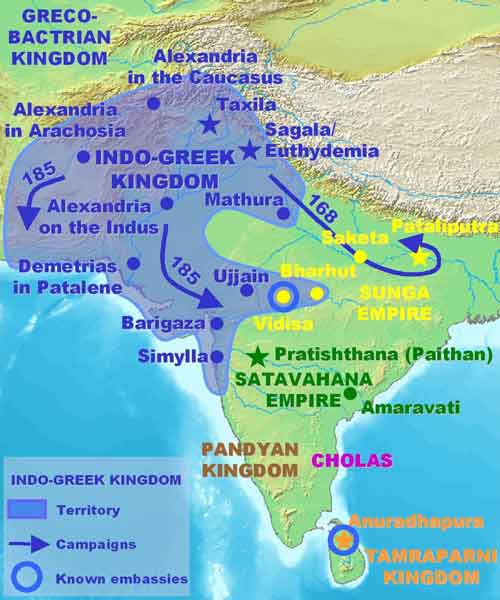AdLandPro Feature
A window To The World
for pleasure, love, and peace.
INDO-GREEK
KINGDOM OF INDIA
Dedicated
to my dear friend
Pauline
Raina,
and
Nirmala Devaprasad, Rahul Majumdar, Rajaram S.K.,
and
all members from India.



PROLOGUE
In school they teach us history but I would rather say stories to make
the western culture more attractive. How many of you knew that Greece (Hellas)
conquered India three times? I presume you don't know that but you know that
the scientists say there is an Indo-European language is the language from
which all the other languages are developed. I have never heard that the conquerors
bow their head, kneed and accept culture and language of countries under their
conquest.
From mythology we know Dionysus and Heracles Expedition to India and from
historical ages we know that Alexander The Great conquered India, but India did
never in mythology or history conquer Greece.
Could reality be different from what is told to us? Yes, I think it could be
the opposite. Hellenic language was the official language in India for more
than 200 years. It is enough to plant in words and meanings in another
language.
EVIDENCE OF THE INTITIAL INVASION
Greco-Roman sources
According to Strabo, Greek advances temporarily went as far as the Sunga
capital Pataliputra (today Patna) in eastern India:
“Those who, after Alexander, advanced beyond the Hypanis, to the Ganges
and Pataliputra.” (Strabo, 15-1-27)
The 1st century BC Greek historian Apollodorus, quoted by Strabo,
affirms that the Bactrian Greeks, led by Demetrius I and Menander, conquered India
and occupied a larger territory than the Macedonians under Alexander the Great,
going beyond the Hypanis towards the Himalayas.
The Roman historian Justin also mentioned the Indo-Greek conquests,
describing Demetrius as Regis Indorum “King of the Indians”, and explaining
that after vanquishing him Eucratides in turn “put India under his rule” (Indiam
in potestatem redegit).[3] Although “India” only meant the upper Indus for
Alexander the Great, since the embassies of Megasthenes in the 3rd century BC “India”
meant to the Greeks most of the northern half of the Indian subcontinent, an
area roughly corresponding to the extent of the Mauryan Empire at its largest.
To the south, the Greeks occupied the areas of the Sindh and Gujarat
down to the region of Surat (Greek: Saraostus) near Mumbai (Bombay), including
the strategic harbour of Barigaza (Bharuch), as attested by several writers
(Strabo 11; Periplus of the Erythraean Sea, Chap. 41/47) and as evidenced by
coins dating from the Indo-Greek ruler Apollodotus I:
“The Greeks... took possession, not only of Patalena, but also, on the
rest of the coast, of what is called the kingdom of Saraostus and Sigerdis”.
(Strabo 11.11.1)
The 1st century AD Periplus of the Erythraean Sea describes numerous Greek
buildings and fortifications in Barigaza, although mistakenly attributing them
to Alexander, and the circulation of Indo-Greek coinage in the region:
“In these places there remain even to the present time signs of the
expedition of Alexander, such as ancient shrines, walls of forts and great
wells”. Periplus, Chap. 41
“To the present day ancient drachmae are current in Barygaza, coming
from this country, bearing inscriptions in Greek letters, and the devices of
those who reigned after Alexander, Apollodorus and Menander”. Periplus Chap. 47
Indian sources
Various Indian records describe Greek (called Yavana) attacks on
Mathura, Panchala, Saketa, and Pataliputra. Patanjali, a grammarian and
commentator on Panini around 150 BC, describes in the Mahabhasya, the invasion
in two examples using the imperfect tense of Sanskrit, denoting a recent event:
“Arunad Yavanah Saketam” (“The Yavana were besieging Saketa”)
“Arunad Yavano Madhyamikam” (The Yavana were besieging Madhyamika (the “Middle
country”).
The Anushasanaparava of the Mahabharata affirms that the country of
Mathura, the heartland of India, was under the joint control of the Yavanas and
the Kambojas.[7] Accounts of battles between the Greeks and the Sunga in
Central India are also found in the Malavikagnimitra, a play by Kalidasa which
describes a battle between Greek forces and Vasumitra, the grandson of
Pushyamitra, during the latter's reign.
Also the Brahmanical text of the Yuga Purana, which describes Indian
historical events in the form of a prophecy, relates the attack of the
Indo-Greeks on the capital Pataliputra, a magnificent fortified city with 570
towers and 64 gates according to Megasthenes, and describes the ultimate
destruction of the city's walls:
“Then, after having approached Saketa together with the Panchalas and
the Mathuras, the Yavanas, valiant in battle, will reach Kusumadhvaja “The town
of the flower-standard”, Pataliputra. Then, once Puspapura (another name of
Pataliputra) has been reached and its celebrated mud[-walls] cast down, all the
realm will be in disorder.” (Yuga Purana, Paragraph 47-48, 2002 edition).
According to the Yuga Purana a situation of complete social disorder
follows, in which the Yavanas rule and mingle with the people, and the position
of the Brahmins and the Sudras is inverted:
“Sudras will also be utterers of bho (a form of address used towards an
equal or inferior), and Brahmins will be utterers of arya (a form of address
used towards a superior), and the elders, most fearful of dharma, will
fearlessly exploit the people. And in the city the Yavanas, the princes, will
make this people acquainted with them: but the Yavanas, infatuated by war, will
not remain in Madhyadesa” (Yuga Purana, Paragraph 55-56, 2002 edition).
Yavan, Yunan,
Yunanistan, Yona are other names for Ionia a name which was used for ancient
Greece (Hellas).
Kindly Regards
Georgios